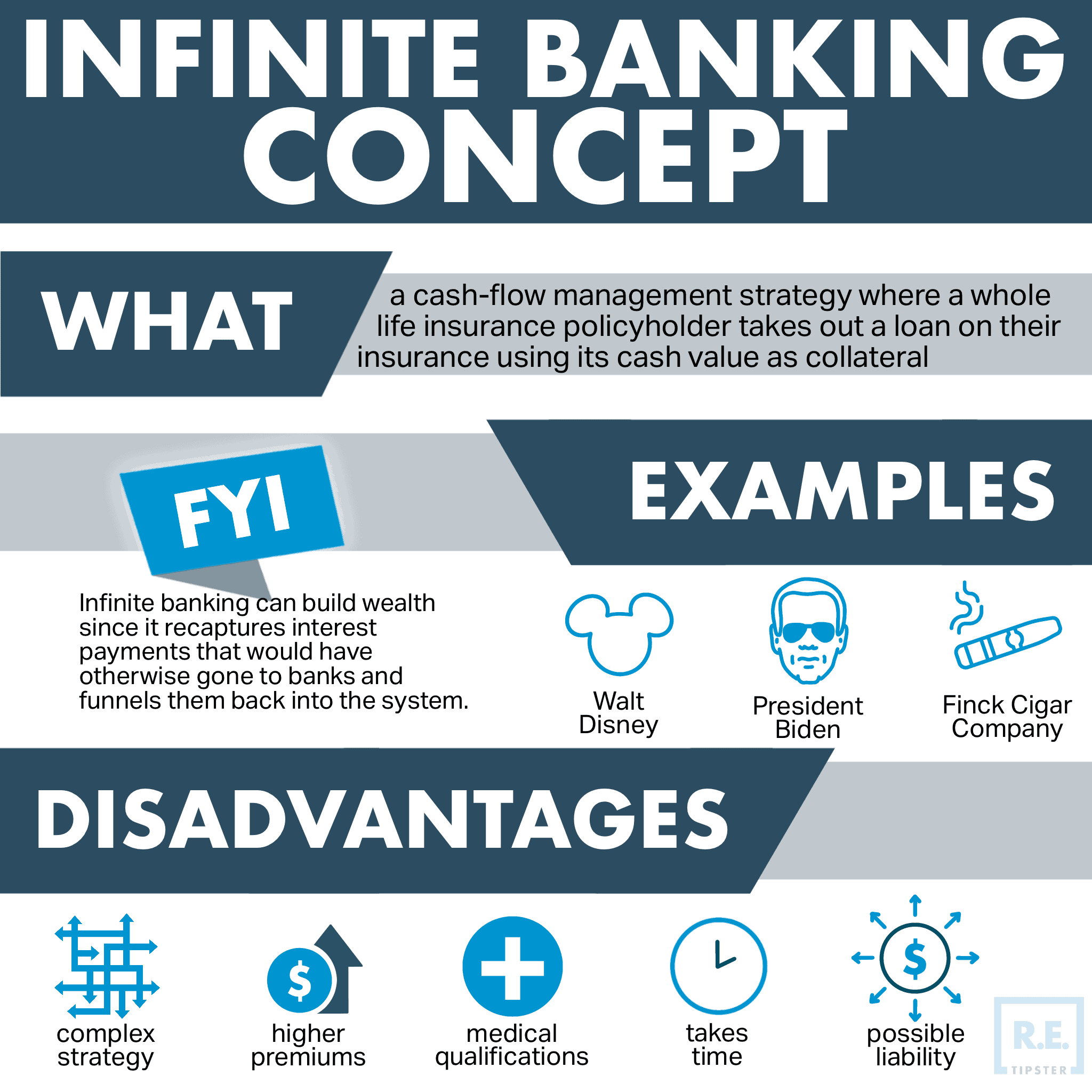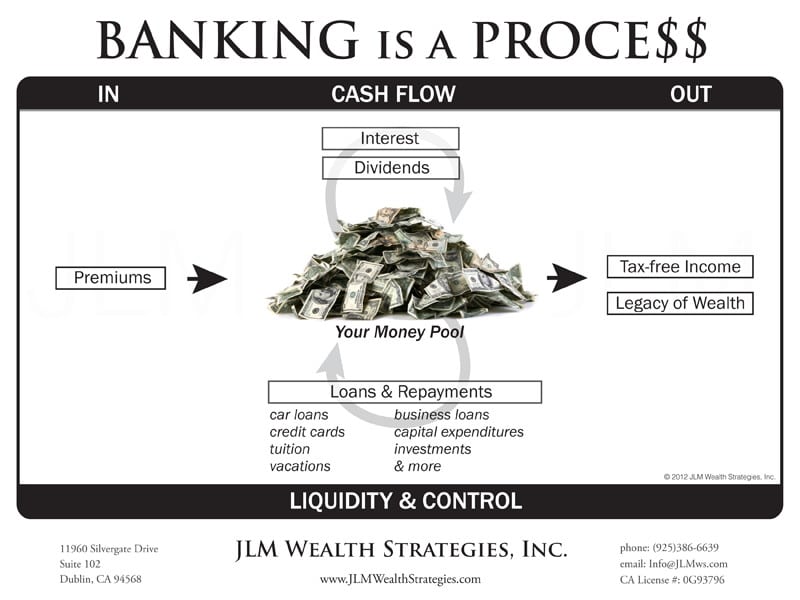All Categories
Featured
Table of Contents
The drawbacks of infinite banking are frequently forgotten or not pointed out whatsoever (much of the details readily available concerning this principle is from insurance representatives, which may be a little biased). Just the cash worth is growing at the reward rate. You also need to spend for the price of insurance policy, charges, and expenditures.

Companies that offer non-direct acknowledgment loans may have a reduced reward rate. Your cash is locked right into a complicated insurance product, and surrender fees normally don't go away up until you have actually had the policy for 10 to 15 years. Every long-term life insurance policy plan is different, but it's clear someone's general return on every dollar invested in an insurance item can not be anywhere near to the returns rate for the plan.
How To Be Your Own Bank
To offer a really basic and hypothetical instance, allow's think somebody is able to gain 3%, on standard, for every buck they invest on an "infinite banking" insurance coverage product (after all costs and fees). If we think those dollars would certainly be subject to 50% in taxes amount to if not in the insurance policy item, the tax-adjusted rate of return could be 4.5%.

We assume higher than ordinary returns on the whole life item and an extremely high tax rate on dollars not place right into the policy (that makes the insurance product look much better). The truth for lots of people might be even worse. This fades in contrast to the lasting return of the S&P 500 of over 10%.
Boundless banking is a fantastic item for representatives that sell insurance, yet may not be optimal when contrasted to the more affordable alternatives (with no sales people making fat compensations). Right here's a break down of several of the other purported advantages of unlimited banking and why they might not be all they're fractured up to be.
Infinite Banking Concepts
At the end of the day you are getting an insurance coverage product. We like the security that insurance uses, which can be gotten a lot less expensively from a low-cost term life insurance plan. Unsettled finances from the plan might additionally reduce your fatality advantage, diminishing an additional level of security in the policy.
The idea just functions when you not just pay the substantial premiums, but make use of additional cash money to purchase paid-up additions. The chance expense of all of those bucks is tremendous extremely so when you could instead be buying a Roth IRA, HSA, or 401(k). Also when contrasted to a taxed investment account and even an interest-bearing account, limitless banking may not provide similar returns (compared to spending) and similar liquidity, gain access to, and low/no charge framework (contrasted to a high-yield financial savings account).
With the surge of TikTok as an information-sharing platform, financial guidance and techniques have actually found a novel way of dispersing. One such method that has actually been making the rounds is the limitless financial concept, or IBC for brief, gathering recommendations from celebs like rap artist Waka Flocka Flame. While the method is currently popular, its roots map back to the 1980s when economist Nelson Nash introduced it to the globe.

Within these plans, the cash money worth expands based on a price established by the insurance firm. Once a significant cash worth gathers, insurance policy holders can acquire a cash money value finance. These lendings differ from traditional ones, with life insurance policy acting as security, meaning one could lose their protection if loaning excessively without ample cash value to sustain the insurance coverage expenses.
Life Insurance Banking
And while the allure of these plans appears, there are inherent restrictions and dangers, requiring attentive cash worth tracking. The strategy's authenticity isn't black and white. For high-net-worth people or company owner, particularly those making use of methods like company-owned life insurance policy (COLI), the advantages of tax obligation breaks and substance growth could be appealing.
The allure of unlimited banking does not negate its obstacles: Cost: The foundational demand, a permanent life insurance policy policy, is more expensive than its term equivalents. Qualification: Not every person gets whole life insurance policy because of rigorous underwriting processes that can leave out those with details wellness or lifestyle problems. Complexity and danger: The elaborate nature of IBC, coupled with its threats, may prevent many, particularly when simpler and much less dangerous alternatives are available.

Alloting around 10% of your regular monthly earnings to the policy is simply not possible for most individuals. Component of what you read below is just a reiteration of what has already been claimed over.
Before you obtain yourself into a circumstance you're not prepared for, understand the following initially: Although the idea is frequently marketed as such, you're not really taking a lending from yourself. If that were the instance, you wouldn't need to repay it. Rather, you're borrowing from the insurance provider and have to settle it with interest
Infinite Banking Concept Calculator
Some social media blog posts advise using money worth from whole life insurance to pay down credit card debt. When you pay back the funding, a part of that interest goes to the insurance policy company.
For the initial several years, you'll be paying off the commission. This makes it very difficult for your plan to accumulate worth during this time. Unless you can manage to pay a few to several hundred bucks for the following years or more, IBC won't function for you.
Not everyone must depend solely on themselves for economic safety. If you need life insurance policy, right here are some valuable ideas to consider: Take into consideration term life insurance coverage. These policies supply protection during years with substantial economic obligations, like home loans, trainee car loans, or when taking care of little ones. See to it to go shopping about for the ideal price.

Boundless banking is not an item or solution used by a specific organization. Boundless financial is a technique in which you buy a life insurance policy plan that builds up interest-earning cash money value and secure financings versus it, "obtaining from yourself" as a source of capital. At some point pay back the lending and begin the cycle all over once again.
Pay policy costs, a part of which builds cash value. Cash value makes intensifying interest. Take a financing out against the policy's money worth, tax-free. Settle car loans with passion. Money value collects again, and the cycle repeats. If you utilize this concept as meant, you're taking cash out of your life insurance coverage plan to purchase every little thing you would certainly need for the rest of your life.
Latest Posts
Ibc Whole Life Insurance
Dave Ramsey Infinite Banking Concept
Bank On Yourself Life Insurance